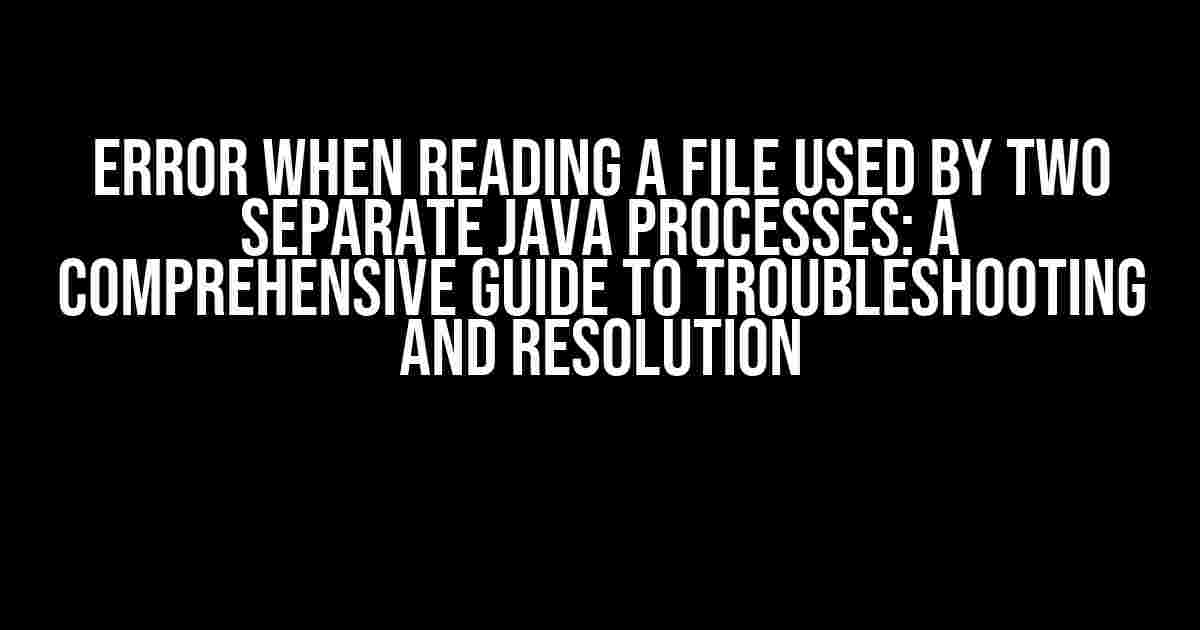Are you tired of encountering the frustrating error “Error when reading a file used by two separate Java processes”? Do you find yourself scratching your head, wondering what’s causing this issue and how to resolve it? Fear not, dear developer! This article is here to guide you through the troubleshooting and resolution process, ensuring you can get back to coding in no time.
Understanding the Error
The error “Error when reading a file used by two separate Java processes” typically occurs when two or more Java processes attempt to access the same file simultaneously. This can happen when multiple instances of your Java application are running, or when different applications are trying to read or write to the same file.
Why Does This Error Occur?
There are several reasons why this error might occur:
- Concurrency issues**: When multiple threads or processes attempt to access the same file simultaneously, it can lead to concurrency issues, resulting in this error.
- File locking**: If one process has locked the file for writing, other processes may not be able to read from it, leading to this error.
- Resource constraints**: Limited system resources, such as memory or disk space, can cause issues when multiple processes are trying to access the same file.
Troubleshooting Steps
Before we dive into the resolution, let’s go through some troubleshooting steps to help you identify the root cause of the issue:
- Check for multiple instances of your application**: Ensure that you don’t have multiple instances of your Java application running. If you do, try closing them and see if the error persists.
- Verify file access permissions**: Check that your application has the necessary permissions to read and write to the file. You can do this by checking the file’s properties or using the `Permissions` class in Java.
- Monitor system resources**: Keep an eye on system resources such as memory and disk space. If these resources are depleted, it may cause issues with file access.
- Check for file locking**: Use tools like `lsof` (on Linux/macOS) or `Process Explorer` (on Windows) to check if any other process has locked the file.
Resolution Strategies
Now that we’ve gone through the troubleshooting steps, let’s explore some resolution strategies to help you overcome this error:
1. File Locking Mechanisms
Implementing file locking mechanisms can help prevent multiple processes from accessing the same file simultaneously. You can use Java’s built-in `FileLock` class or a third-party library like Apache Commons IO:
import java.io.File;
import java.io.IOException;
import java.io.RandomAccessFile;
import java.nio.channels.FileChannel;
import java.nio.channels.FileLock;
public class FileLocker {
public static void main(String[] args) {
File file = new File("example.txt");
RandomAccessFile randomAccessFile = new RandomAccessFile(file, "rw");
FileChannel fileChannel = randomAccessFile.getChannel();
FileLock fileLock = fileChannel.tryLock();
if (fileLock != null) {
try {
// Perform file operations here
} finally {
fileLock.release();
fileChannel.close();
randomAccessFile.close();
}
} else {
System.out.println("Failed to acquire file lock");
}
}
}
2. Synchronized File Access
Another approach is to use synchronized file access using Java’s `synchronized` keyword. This ensures that only one thread can access the file at a time:
public class SynchronizedFileAccessor {
private static synchronized void accessFile(String filename) {
// Perform file operations here
}
}
3. Temporal File Access
In some cases, you may want to implement temporal file access, where you delay file access until the file is no longer in use. You can use Java’s `ScheduledExecutorService` to schedule a task to access the file at a later time:
import java.util.concurrent.Executors;
import java.util.concurrent.ScheduledExecutorService;
import java.util.concurrent.TimeUnit;
public class TemporalFileAccessor {
public static void main(String[] args) {
ScheduledExecutorService executorService = Executors.newSingleThreadScheduledExecutor();
executorService.schedule(() -> {
// Perform file operations here
}, 1, TimeUnit.SECONDS);
}
}
Best Practices
To avoid encounters with this error in the future, follow these best practices:
| Best Practice | Description |
|---|---|
| Use file locking mechanisms | Implement file locking mechanisms to prevent multiple processes from accessing the same file simultaneously. |
| Synchronize file access | Use synchronized file access to ensure that only one thread can access the file at a time. |
| Monitor system resources | Keep an eye on system resources such as memory and disk space to prevent resource constraints. |
| Use temporal file access | Implement temporal file access to delay file access until the file is no longer in use. |
Conclusion
Encountering the “Error when reading a file used by two separate Java processes” can be frustrating, but with the right troubleshooting steps and resolution strategies, you can overcome this issue. By implementing file locking mechanisms, synchronizing file access, monitoring system resources, and using temporal file access, you can ensure that your Java application can smoothly read and write files even in multi-process environments. Remember to follow best practices to avoid future encounters with this error.
Happy coding!
Here are 5 Questions and Answers about “Error when reading a file used by two separate Java processes” in a creative voice and tone, using HTML format:
Frequently Asked Question
Ever wondered what happens when two Java processes try to read the same file at the same time? We’ve got the answers!
Why do I get an error when two separate Java processes try to read the same file?
This is because the operating system locks the file when one process is reading it, to prevent multiple processes from modifying the file simultaneously. When the second process tries to read the same file, it can’t access it because of the lock, resulting in an error.
How can I avoid this error when reading a file used by two separate Java processes?
One way to avoid this error is to use a lock mechanism, such as Java’s `FileLock` class, to ensure that only one process can access the file at a time. Another approach is to use a temporary file or a caching mechanism to reduce the need for concurrent file access.
What is a FileLock and how does it help in this scenario?
A `FileLock` is a lock on a file, which can be used to prevent other processes from accessing the file while it’s being read or written. In this scenario, the first process can acquire a `FileLock` on the file, and the second process will wait until the lock is released before attempting to read the file.
Can I use a synchronized block to prevent concurrent file access?
No, a synchronized block only synchronizes access within a single Java Virtual Machine (JVM). Since we’re dealing with two separate Java processes, a synchronized block won’t help in this case. We need to use a mechanism that works across processes, such as a `FileLock` or an operating system-level lock.
What are some best practices to avoid file-related issues in multi-process Java applications?
Some best practices include using lock mechanisms, avoiding shared files whenever possible, using temporary files or caching, and implementing retry mechanisms to handle transient file access errors. Additionally, consider using a distributed lock service or a centralized file management system to coordinate file access across multiple processes.



